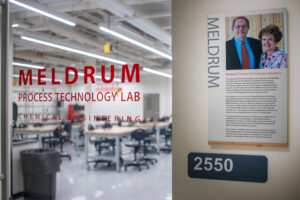Even when Chemical Engineering students are focusing on atomic-level complex reactions, or seeking to understand the fundamental principles of thermodynamics, the actual, larger physical space in which they conduct their research plays an essential role in their education.
Thanks to the generous support of the Meldrum Foundation and other donors, undergraduate students in the Price College of Engineering’s Department of Chemical Engineering now have a new lab specifically designed to promote more integrated, interactive, and collaborative learning.
 The Meldrum Process Technology Lab, located on the second floor of the Merrill Engineering Building, opened its doors last month. Aside from its new equipment, including a student-designed fluid flow bench and packed bed reactor, it differs from traditional engineering instructional labs with its innovative design.
The Meldrum Process Technology Lab, located on the second floor of the Merrill Engineering Building, opened its doors last month. Aside from its new equipment, including a student-designed fluid flow bench and packed bed reactor, it differs from traditional engineering instructional labs with its innovative design.
“We really focused on the openness of the space,” says Tony Butterfield, professor (lecturer) and Associate Chair of the Department of Chemical Engineering. “Basically, the idea is to give students plenty of opportunities to collaborate in teams, keep the space wide open so that students can see all the equipment being used. It really facilitates students picking up those skills just through observation.”
Butterfield explains that the lab, with its central tables surrounded by equipment-lined walls, is not just meant to teach engineering techniques, but to enhance the social aspect of research.
“It’s meant to teach them how to work with others; to compromise, negotiate and resolve conflicts,” he says, “They can do that here much more easily than in a traditional, compartmentalized research space.”
By being open outside of lab periods, the lab will also serve as a study space and lounge for students, further increasing opportunities for connection and understanding.
The positive effects of this type of environment don’t just sound like a good idea — they’ve been proven. The Meldrum Process Technology Lab builds on the success of the Meldrum Innovation Lab on Merrill’s first floor. The former is geared more towards advanced undergraduate students, and specifically the junior and senior level “Unit Operation Courses,” yet employs the same collaboration-centric design.
In a 2020 paper, Butterfield compared first year courses taken in the Innovation Lab to the same courses taken in a traditional ‘siloed’ lab space. The results? Use of the open-layout lab led to statistically significant increase in grades, and an almost 100% increase in time spent training on equipment.
All this is in line with the spirit of the late Peter Meldrum, Utah Chemical Engineering alumni, co-founder and former CEO of Myriad Genetics, and founding member of the Engineering National Advisory Council. With this naming gift the Meldrum foundation and its trustees continue Pete’s mission to “prepare the technology leaders and innovators of the future.”